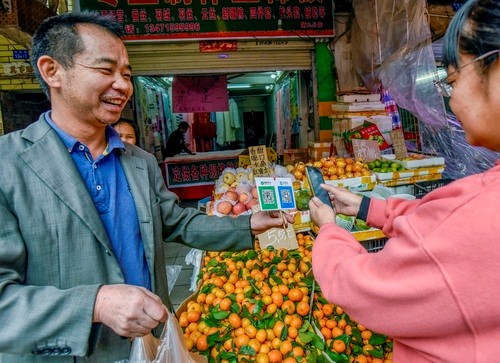

WeChat, a popular instant messaging app developed by China’s internet giant Tecent, broke one billion benchmark for the first time in terms of monthly global active users during the 2018 Spring Festival holiday, according to Pony Ma Huateng, chairman and chief executive officer of the company on Mar. 5, 2018.

A passenger scans a QR code to make a purchase on a train, February 7, 2018. Payments through WeChat, Alipay and other mobile payment channels are available on many Chinese trains during the 2018 “Chunyun”, or Spring Festival travel rush. (Photo: CFP)
The app has accelerated its pace to go overseas, Ma, also a deputy to the 13th National People's Congress (NPC) disclosed on the sidelines of the ongoing meeting, adding that it is now applying for overseas payment licenses.
He added that Malaysia has granted WeChat a third-party payment license.
WeChat user accounts registered an annual growth of 15.8 percent, with 902 million users sending 38 billion messages daily, according to an official report released by Tencent last September.
The surge of WeChat users indicates China’s booming digital economy. China’s digital economy totaled at 22.58 trillion yuan ($3.56 trillion) in 2016, ranking second globally and accounting for 30.3 percent of the national GDP, according to recent reports on Internet development of China and the world.
The reports also showed 5 billion clicks and searches each day on Baidu, a top search engine in China, and 175 million daily transactions through China’s mobile payment service Alipay.
Describing the digital economy as the fastest growing, most innovative and most radiant economic activity in 2017, Ma said that major global technology and Internet companies are catching the opportunity.

A customer scans a QR code to pay for fruit in Nanning, capital city of south China’s Guangxi Zhuang Autonomous Region, December 23, 2017. Mobile payments are gradually replacing cash payments in China. (Photo: CFP)
In the new round of technological revolution, Chinese companies have shifted their role from followers to drivers and contributors of new technologies, and are progressing with their global partners in a coordinated manner, Ma pointed out.
Products of China’s fast-developing digital economy, including shared bikes, mobile payments, unmanned shelves and online education, have brought conveniences and surprises to people’s life, and penetrated into a wide range of industries, he added.
 Fire brigade in Shanghai holds group wedding
Fire brigade in Shanghai holds group wedding Tourists enjoy ice sculptures in Datan Town, north China
Tourists enjoy ice sculptures in Datan Town, north China Sunset scenery of Dayan Pagoda in Xi'an
Sunset scenery of Dayan Pagoda in Xi'an Tourists have fun at scenic spot in Nanlong Town, NW China
Tourists have fun at scenic spot in Nanlong Town, NW China Harbin attracts tourists by making best use of ice in winter
Harbin attracts tourists by making best use of ice in winter In pics: FIS Alpine Ski Women's World Cup Slalom
In pics: FIS Alpine Ski Women's World Cup Slalom Black-necked cranes rest at reservoir in Lhunzhub County, Lhasa
Black-necked cranes rest at reservoir in Lhunzhub County, Lhasa China's FAST telescope will be available to foreign scientists in April
China's FAST telescope will be available to foreign scientists in April "She power" plays indispensable role in poverty alleviation
"She power" plays indispensable role in poverty alleviation Top 10 world news events of People's Daily in 2020
Top 10 world news events of People's Daily in 2020 Top 10 China news events of People's Daily in 2020
Top 10 China news events of People's Daily in 2020 Top 10 media buzzwords of 2020
Top 10 media buzzwords of 2020 Year-ender:10 major tourism stories of 2020
Year-ender:10 major tourism stories of 2020 No interference in Venezuelan issues
No interference in Venezuelan issues
 Biz prepares for trade spat
Biz prepares for trade spat
 Broadcasting Continent
Broadcasting Continent Australia wins Chinese CEOs as US loses
Australia wins Chinese CEOs as US loses